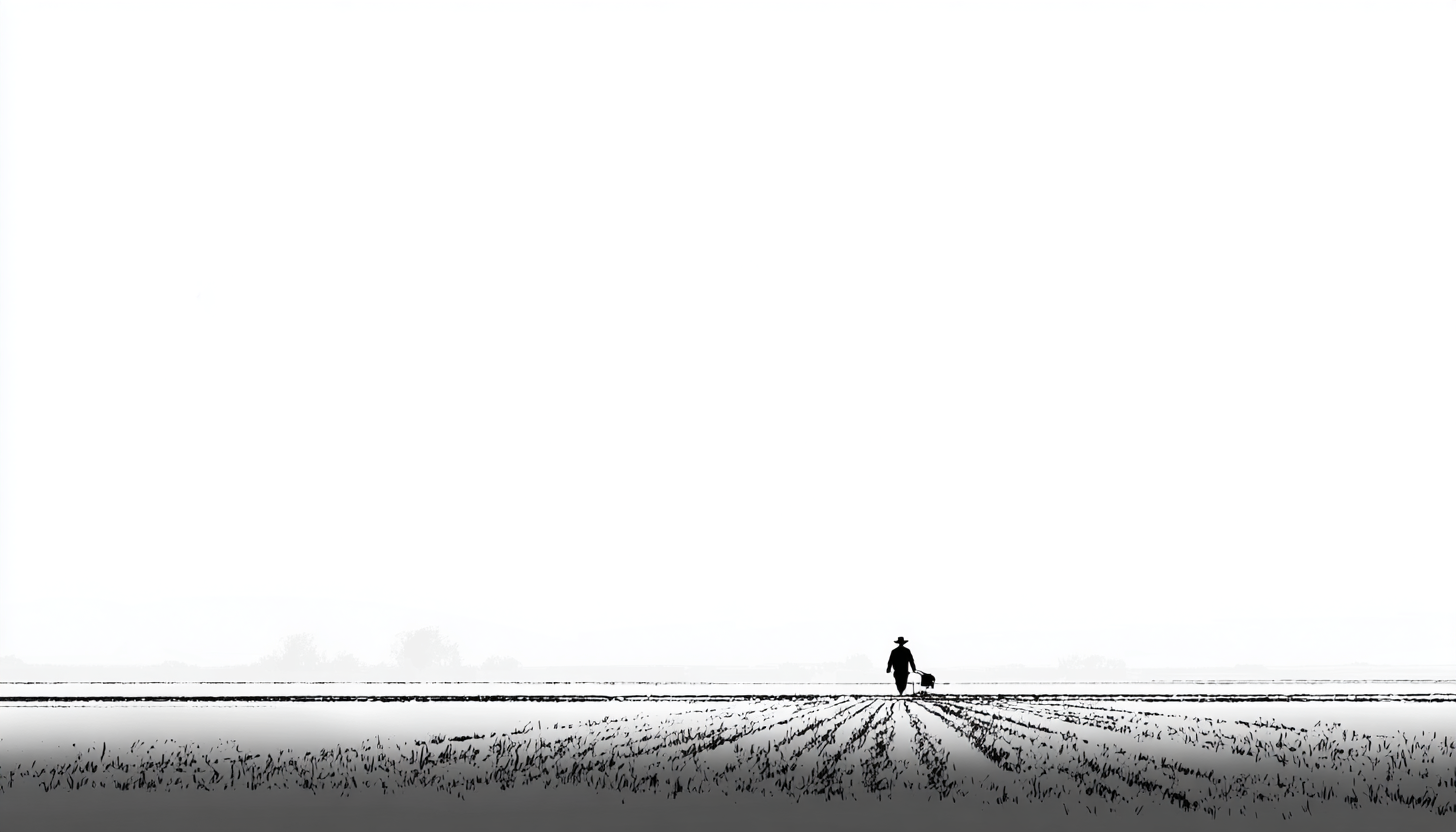
Catallaxy and Scale: From Self to Society
Planning dinner for a household is a test of coordination. Ingredients must be available, likes and dislikes remembered, dietary restrictions respected, time managed, and budgets followed. And this is a simplified case. Even at the scale of just a single family, ingredients can go missing or stale, schedules collide, and minor miscalculations make for a stressful supper time.
Now imagine attempting the same task for an entire city.

Markets,Time, and the Miracle of Catallaxy
A farmer who plants in April will know by October whether he chose wisely. But October’s knowledge is too late to revise April’s decision. The seed is spent, the soil has been worked, and the season has moved on. He can harvest what has grown, learn from the result, and try again next year, but nothing allows him to go back.
Every human decision is made under this peculiar constraint.

You Can’t Average Out Ruin: A River, A Portfolio, and What Matters
A six-foot-tall person decides to cross a river whose average depth is five feet five. The margin looks adequate. Mid-crossing, the river deepens without warning, footing disappears, and the person drowns. The story is usually told as a warning about averages, which is fair as far as it goes. But it does not go far enough.

Unwealth: Why “Wealthy” Is a Meaningless Idea
If wealth were an absolute measure, two people with identical balance sheets would yield matching internal states. They never do. Wealth is not like height or temperature; it is closer to pressure, a force created by the relationship between two things rather than the magnitude of one.

Catallaxy: The Forgotten Word That Explains Markets
Friedrich Hayek revived this obscure word from Greek antiquity, dusted it off, and tried to set it to work. It never found its way into the economics lexicon and has largely disappeared from modern discourse. The irony is almost perfect: a word meant to describe emergence could not manage to emerge. Yet Hayek was right; our common words, “market” and “economy,” are too thin and misleading for the reality they attempt to describe.

The Cost of Whole Shares: Why Fractional Shares Matter More Than You Think
A clock can lose a single second each day and hardly be noticed. It ticks on, imperceptibly out of step with the truth. The error is so small that it feels irrelevant until the days accumulate into weeks, the weeks into months, and eventually the loss is no longer measured in seconds but in hours.
Portfolios can drift in the same way.

The Invisible Apple: A Dialogue on Belief, Price, and Paradox
This dialogue was inspired by the recursive brilliance of Douglas Hofstadter and the whimsical logic of Lewis Carroll. It’s part satire, part philosophy, and, like the market, a little bit absurd.

The Future Tax Hedge: Why Roth Accounts Matter More Than Ever
There’s no shortage of articles and hot takes comparing Roth and Traditional retirement accounts. Most of them walk you through marginal tax rates, retirement income projections, and maybe offer a simple calculator to “optimize” your contributions. But here’s the thing: optimizing the unknowable is a fool’s errand.

Closing the Loop: The Trade Deficit in an Age of Half-Truths
Few concepts in economics are as routinely mischaracterized as a trade deficit. It is often portrayed as a measure of national decline, a scoreboard where exports represent wins and imports represent failure. This framing, although appealing, is both analytically weak and historically outdated.

Tariffs Beyond Headlines: Part III: Protectionism’s Political Price
Tariffs are often presented as instruments of national strength — tools to reclaim sovereignty, defend domestic workers, and reassert control over the disruptive forces of globalization. But when viewed through a wider lens — economic, institutional, and philosophical — that strength reveals itself as illusion.

Tariffs Beyond Headlines: Part II: Innovation, Institutions, and Influence
Tariffs don’t just raise prices — they quietly corrode the systems that allow economies to thrive. They distort incentives, shrink global relationships, and dull the competitive edge that drives innovation, trust, and long-term prosperity.

Tariffs Beyond Headlines: Part I: Trade, Trust, and the Machinery of Markets
In recent months, I’ve had a number of conversations about tariffs — some with clients, some with friends, many prompted by the current trade war. These conversations have been thoughtful, sometimes spirited, and always grounded in a genuine desire to understand what’s actually at stake.

Risk by the Grain: What Investors Miss About Risk
In our common understanding, risk often appears as a single, dramatic event — a market crash, an economic recession, or a sharp correction. Yet this view misses the true nature of risk, which builds not through sudden breaks but through small, barely noticeable shifts beneath the surface of apparent stability. The real danger takes shape long before headlines announce it: the buildup of leverage, mounting deficits, overlooked correlations, and the quiet erosion of safety margins.

In Praise of Operating at My Scale
In an industry focused intensely on scale, I’ve chosen a different path: to stay small. Deliberately, strategically, and without apology. While many peers chase expansion, I’m pursuing something more elusive — a practice that serves my life rather than consumes it.

Meditations on Markets: Investment Lessons from Marcus Aurelius
Marcus Aurelius did not write for fame or legacy nor to instruct future philosophers; his Meditations were private reflections, reminders to himself of virtue, resilience, and clarity amidst profound chaos. As Emperor of Rome, Marcus navigated relentless warfare, the devastating Antonine Plague, insurrection within his own ranks, and the profound grief of losing many of his children. His Stoic writings thus carry a unique credibility — tested and refined by the harshest realities of leadership and human suffering.

The Pivot: Navigating a Market No Longer Built on Tangible Assets
In the early 1980s, Intel was losing ground fast. Japanese competitors dominated the memory chip market, pushing Intel to the brink. Anxious boardroom discussions concerned a key question: clutch at the familiar or try something different? Andy Grove chose the latter. He pivoted Intel away from memory chips and redirected it into microprocessors — a gamble that ultimately saved the company.

Hannibal’s Cannae Playbook: Ancient Lessons for Modern Investors
In the summer of 216 BCE, the ancient Mediterranean world held its breath as two superpowers faced off in a battle for supremacy. The Roman Republic, desperate to end a string of humiliating defeats, staked everything on a single, massive confrontation. What followed was one of the most stunning tactical victories in military history.

Counterpoint and Capital: Investing Lessons from Bach
In The Art of Fugue, Bach’s final masterpiece, the music stops mid-phrase, a hauntingly unfinished conclusion that invites listeners to imagine what might have been. Here, Bach left no instructions for tempo or dynamics — just a structure, an intricate framework of interwoven melodies to be decoded, felt, and, with enough patience, understood. Bach’s compositions masterfully balance form and freedom, illustrating that a well-crafted investment portfolio, like his music, thrives on a similar balance between disciplined structure and agile adaptability.

The Fattening of the Pig: Loose Monetary Policy, Fiscal Stimulus, and the Investor's Dilemma
A pen of swine grumbles as they gorge at troughs overflowing with food. Their bellies swell, and their steps grow sluggish, but none pause to wonder why the feast is so plentiful. The hand that fills their trough is not one of kindness—it belongs to the augur, who knows that this momentary abundance is merely a prelude to sacrifice.

Inflation Is Theft, But We Don't Have to Be Victims
Inflation is theft. The loot isn’t just the lost dollar in your wallet or the rising price of your daily bread. It’s worse than that. By eroding the value of money, inflation also erodes our ability to plan for a better tomorrow. And while many try to complicate the causes of inflation, the reality is simple: it’s the result of reckless government policies — unchecked deficit spending and the endless expansion of the money supply.
